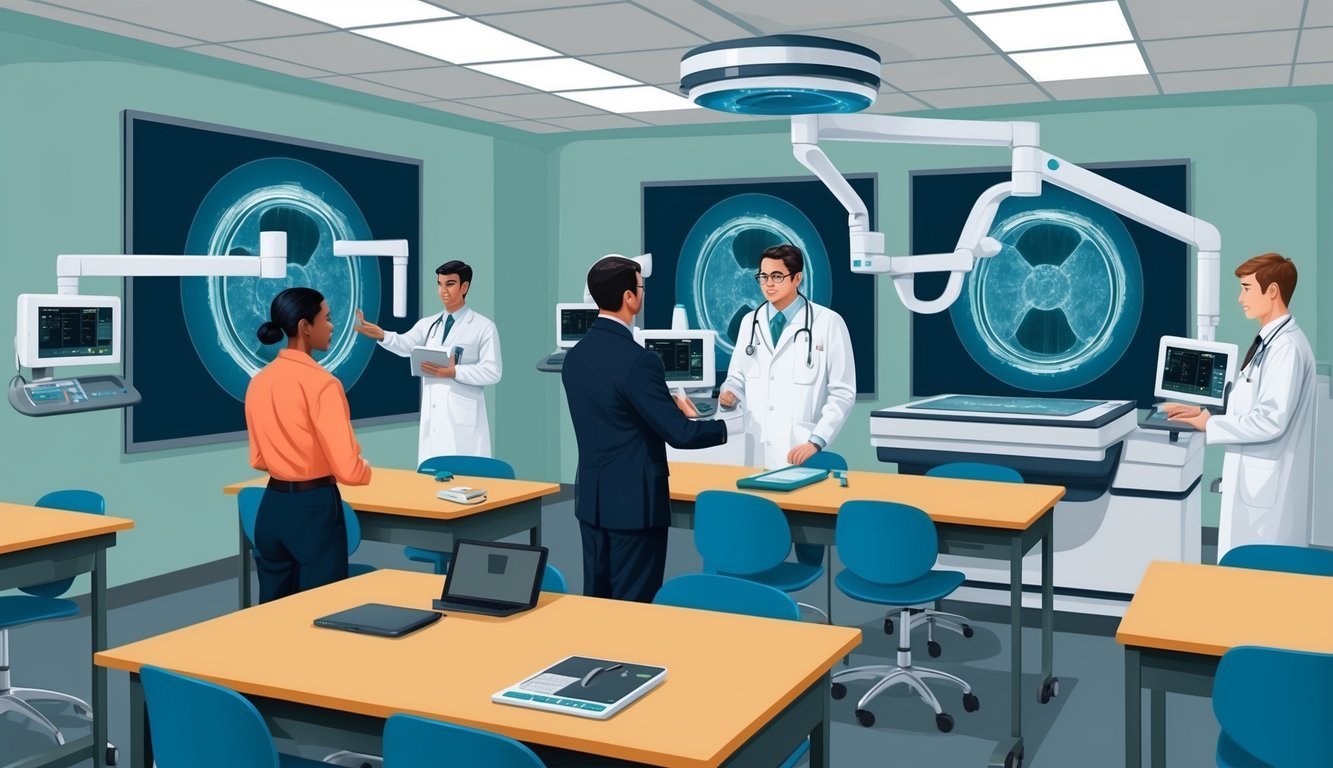“`xml
Thinking about starting a career in radiology? Radiology tech programs are your ticket to a rewarding field.
These courses will teach you the ins and outs of using X-rays, CT scans, and plenty of other imaging tools to help doctors figure out what’s going on with their patients.
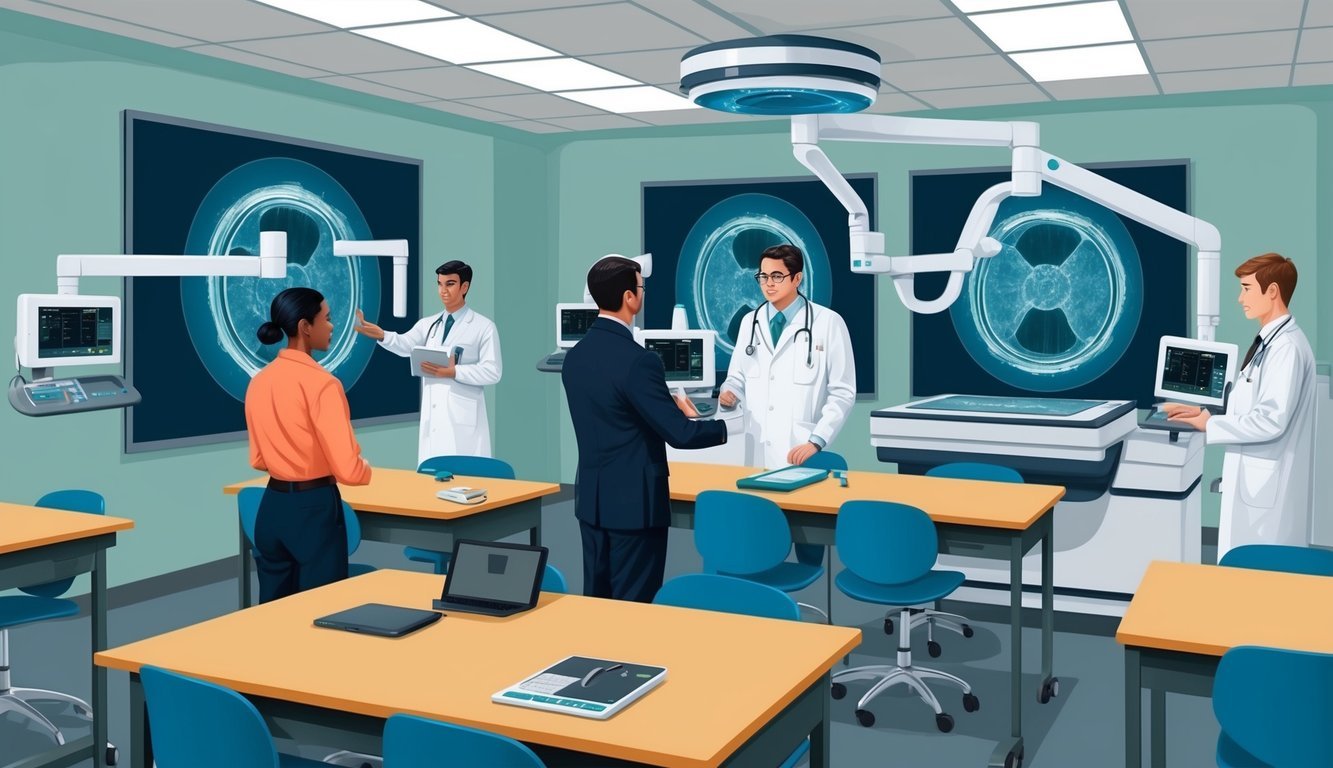
Online radiology tech programs offer an awesome blend of virtual classes and hands-on learning. This setup lets you learn on your schedule while still getting real-world experience.
Plus, a lot of these programs help you prep for certification exams, which can really boost your job prospects once you graduate.
1) Mayo Clinic School of Health Sciences
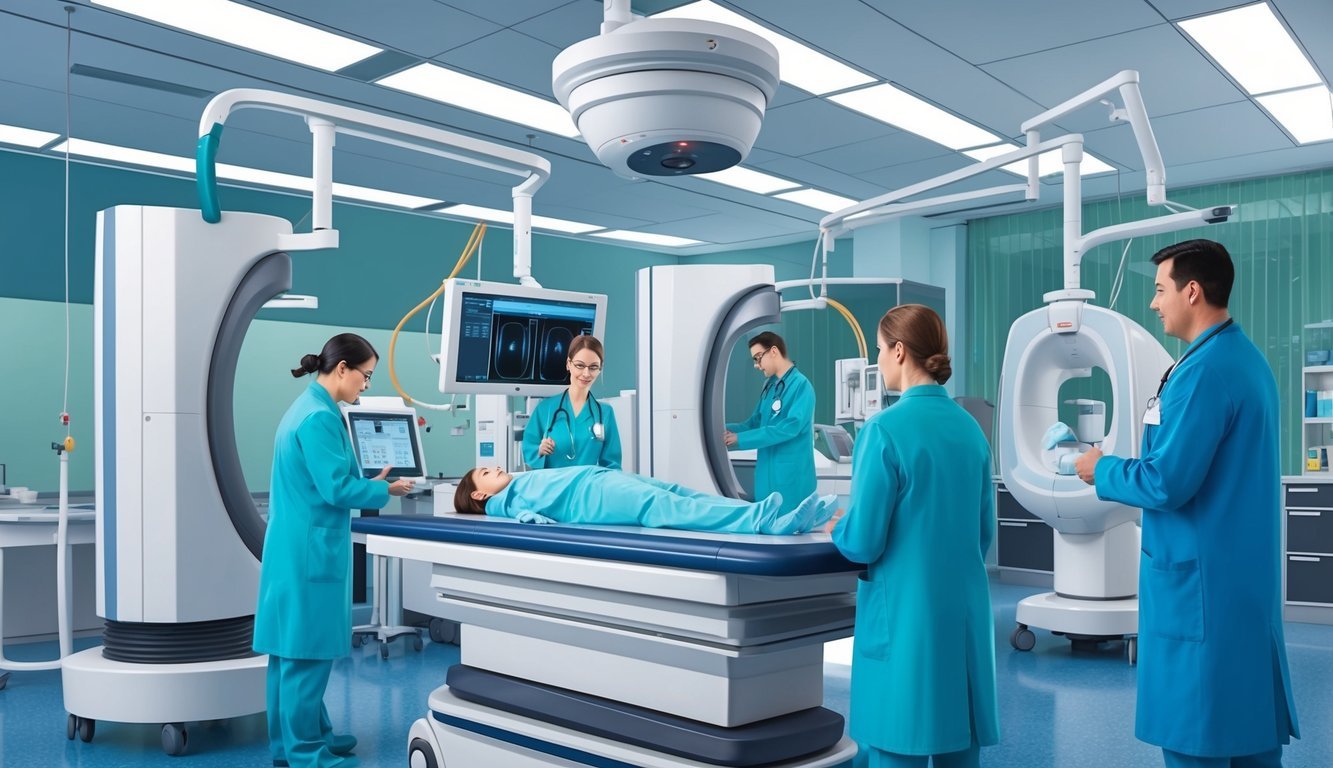
If you’re aiming to become a top-notch radiologic technologist, you can’t go wrong with the Mayo Clinic School of Health Sciences.
Their 18-month Radiography Program in Rochester, Minnesota is a true standout.
You’ll get hands-on experience with cutting-edge equipment and learn from some of the leading experts in the field.
These faculty members aren’t just teachers—they’re also practicing clinicians and researchers!
The curriculum is pretty intensive.
You’ll dive into subjects like anatomy, patient care, and radiation physics.
But don’t worry, you won’t be swimming upstream alone.
Teamwork is a big deal in Mayo’s program.
You’ll be working closely with classmates and instructors, and you’ll get to practice your skills in actual clinical settings.
Curious about what your job could look like? Radiologic technologists at Mayo enjoy diverse days, whether it’s taking X-rays, prepping patients, or working with high-tech imaging tools.
In short, if you’re serious about getting a stellar education in radiography, keep Mayo Clinic on your radar.
The program can be tough, but the rewards are certainly worth it.
2) Johns Hopkins Radiography Program
Looking to become a fantastic radiographer? The Johns Hopkins Radiography Program might just be the perfect fit for you.
It’s been named the best radiologic technologist training program multiple times over the last two decades.
You’ll get hands-on experience in state-of-the-art facilities, blending classroom learning with real-world clinical training.
Expect to learn about anatomy, imaging techniques, and patient care.
Short on time? They’ve got your back! Johns Hopkins now offers a part-time option for their radiography program, letting you wrap up your studies over 23 months while balancing work and your education.
Once you complete the program, you’ll be all set to take the ARRT certification exam, which is essential to kickstart your career as a radiologic technologist.
Want to specialize even further? Johns Hopkins has additional programs, like Magnetic Resonance Imaging (MRI), to help you expand your skills and advance your career.
3) Massachusetts General Hospital Institute
Hey there, future rad techs! Let’s chat about one of the best places for radiology education—Massachusetts General Hospital (MGH).
This spot is a treasure trove for anyone looking to step up their skills.
Even though MGH doesn’t have its own radiologic technology program, don’t sweat it! They’ve partnered with some fantastic colleges to provide you with hands-on experience.
For instance, if you enroll in the radiography program at Bunker Hill Community College, you’ll get to do your clinical training right at MGH.
How cool is that?
At MGH, you’ll work with top-notch radiologists who are dedicated to making sure you get the best training possible.
Plus, they regularly host students from other diagnostic imaging programs.
This hospital has a solid reputation for its alumni, many of whom go on to have successful careers.
So, training here could seriously boost your future!
Remember, MGH is all about giving you real-world experience.
You’ll get to use cutting-edge tech and learn from experts who are passionate about what they do.
Sounds like a solid start to your radiology career!
4) University of California, San Francisco Radiology
UCSF’s radiology program is top-of-the-line.
You’ll gain hands-on experience with cutting-edge tech at one of the best hospitals around.
You’ll work alongside leading experts in diagnostic imaging, honing your skills in patient care.
Plus, UCSF is widely recognized for its top surgical technologist programs, which means you’re getting an education that opens doors in a variety of medical settings.
The UCSF Department of Radiology and Biomedical Imaging has been a trailblazer in the field for over a century! They’re constantly pushing boundaries when it comes to medical imaging.
During your time here, you’ll collaborate with some of the brightest minds in radiology.
The staff at UCSF are passionate about sharing their knowledge and experience with students like you.
From regular continuing education events for radiologists to various imaging services ranging from basic X-rays to advanced MRI scans, you’ll have a front-row seat to the latest and greatest developments in the field.
5) Emory University Radiology Program
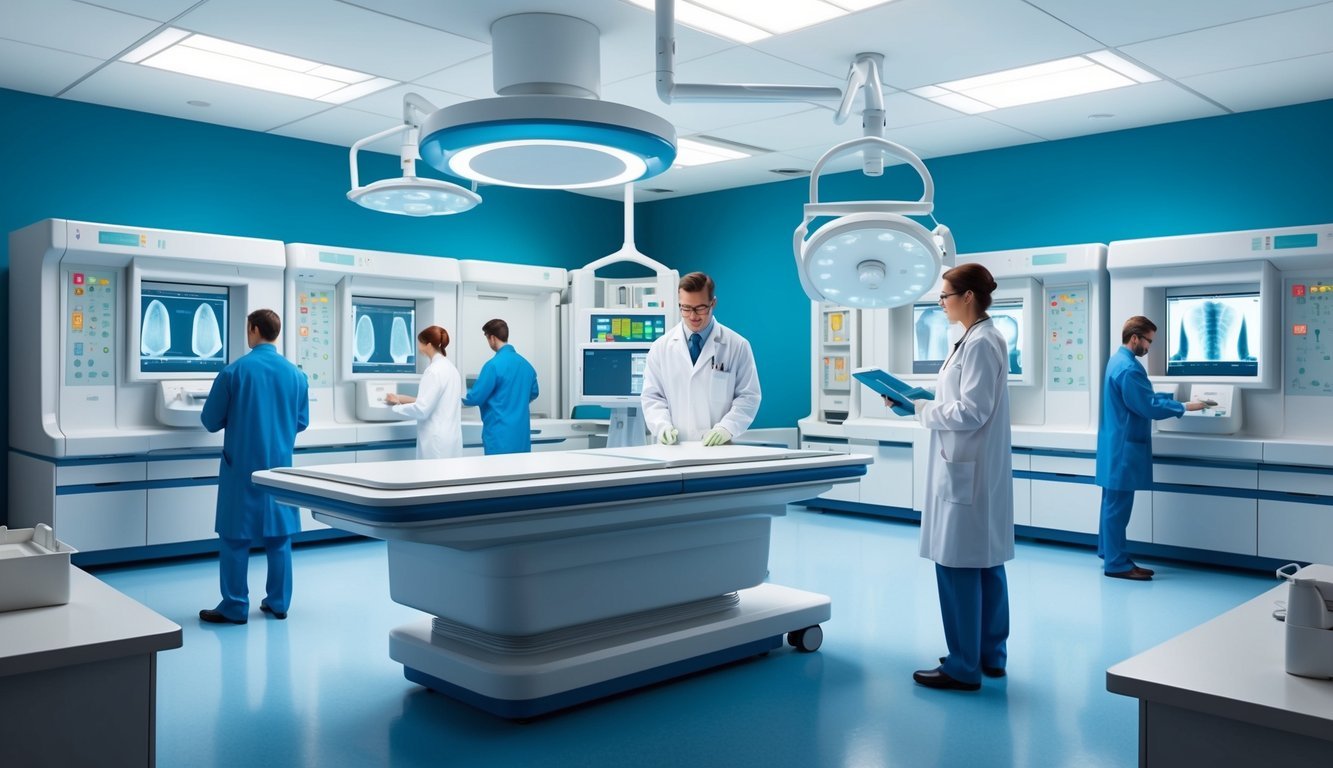
And let me tell you, this program is no cakewalk.
Expect to put in 40 hours a week, full-time.
But it’s not all just homework; you’ll get plenty of hands-on experience along the way.
Emory’s program is accredited by JRCERT, so you know you’re getting a quality education.
They’ve been training rad techs for more than 50 years, and they definitely know their stuff.
If you’re looking to take it a step further, Emory also offers a BMSc Degree Program for Medical Imaging Technologists, recognized as one of the finest radiologic sciences programs out there.
In this program, you’ll learn from experienced professionals while gaining practical skills in real clinical settings.
It’s the perfect mix of theory and hands-on learning.
Understanding Radiology Technician Programs
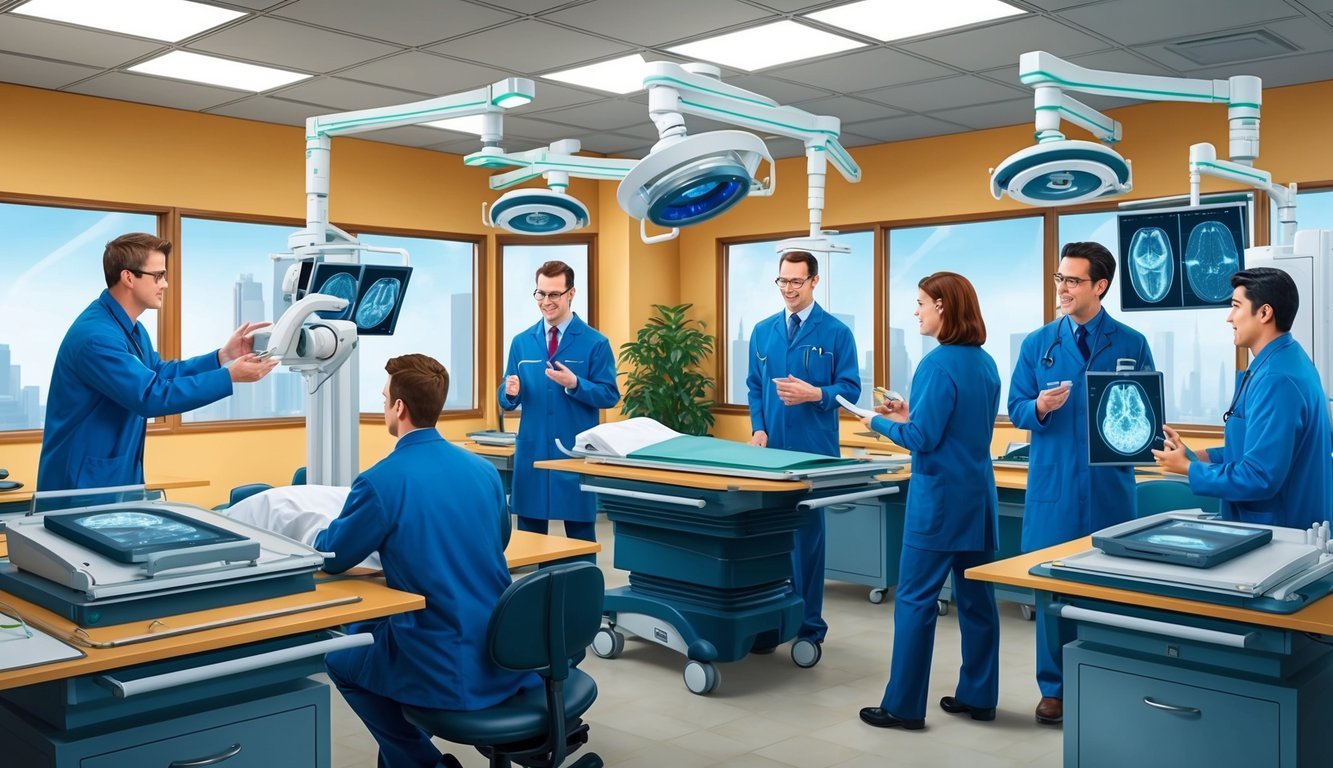
Radiology technician programs teach you the ropes of using imaging equipment and working with patients.
These programs blend classroom instruction with hands-on practice, so you won’t just be stuck in a lecture hall.
Core Curriculum of Radiology Technician Programs
Most programs kick things off with anatomy and physiology.
You’ll get to know your way around the human body and how it functions, which is key to positioning patients accurately for scans.
Math and physics? Yup, those are pretty big deals too.
You’ll be using them to calculate radiation doses and image quality.
Don’t underestimate the importance of patient care! You’ll learn how to communicate with patients and ensure they feel comfortable during their scans.
Don’t forget about radiation safety.
You’ll study how to protect yourself and patients from unnecessary radiation exposure.
Mastering image production and evaluation is crucial too.
You’ll practice taking clear images and assessing their quality to ensure they’re ready for doctors to use.
Clinical Experience Components
Hands-on practice is integral to radiology training.
You’ll find yourself in real medical environments like hospitals and clinics.
During your clinicals, you’ll be using actual imaging equipment—X-ray machines, CT scanners, and MRI machines, you name it.
Positioning patients for different types of scans is an important skill that requires practice and patience.
Working with real patients also helps.
You’ll become better at explaining procedures and helping them relax.
Managing your time well is key here.
You’ll juggle multiple patients and learn how to work efficiently, a skill that’ll serve you well in your career.
You may even get to rotate through different departments, offering a glimpse into various specialties in radiology.
Accreditation and Certification Essentials
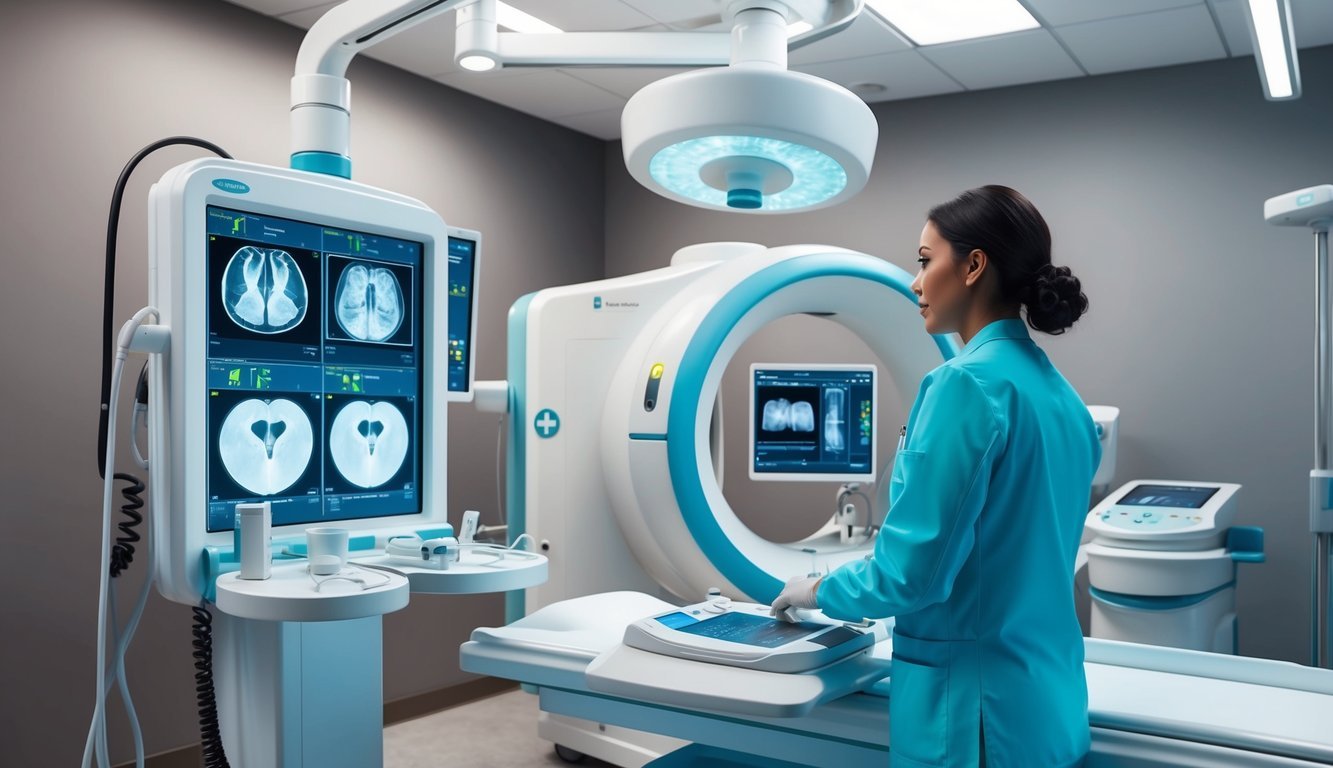
When you’re eyeing a radiology tech program, two things are vital: make sure the school is accredited, and understand how you’ll get certified once you finish.
Importance of Accreditation
Accreditation matters in the world of radiology tech programs.
The Joint Review Committee on Education in Radiologic Technology (JRCERT) is the authority that oversees these programs.
Their goal? To ensure schools are teaching what you really need to know.
A solid accredited program means you’re getting a quality education that holds weight in the job market.
Employers like to see that you come from an accredited school.
Finding accredited programs is straightforward.
Just check the JRCERT website for a list of reputable options.
Certification Pathways
After graduation, you’ll want to get certified.
This is your way of proving you know your stuff.
The main organization for this is the American Registry of Radiologic Technologists (ARRT).
To get your certification, you’ll need to:
- Complete an accredited program
- Pass the ARRT exam
- Follow their ethical standards
The exam covers everything you’ve learned in your program.
It can be tough, but your school should have you well-prepped.
Some states also require that you get a license.
Be sure to check what your state requires; it’s usually pretty close to the ARRT certification.
Frequently Asked Questions
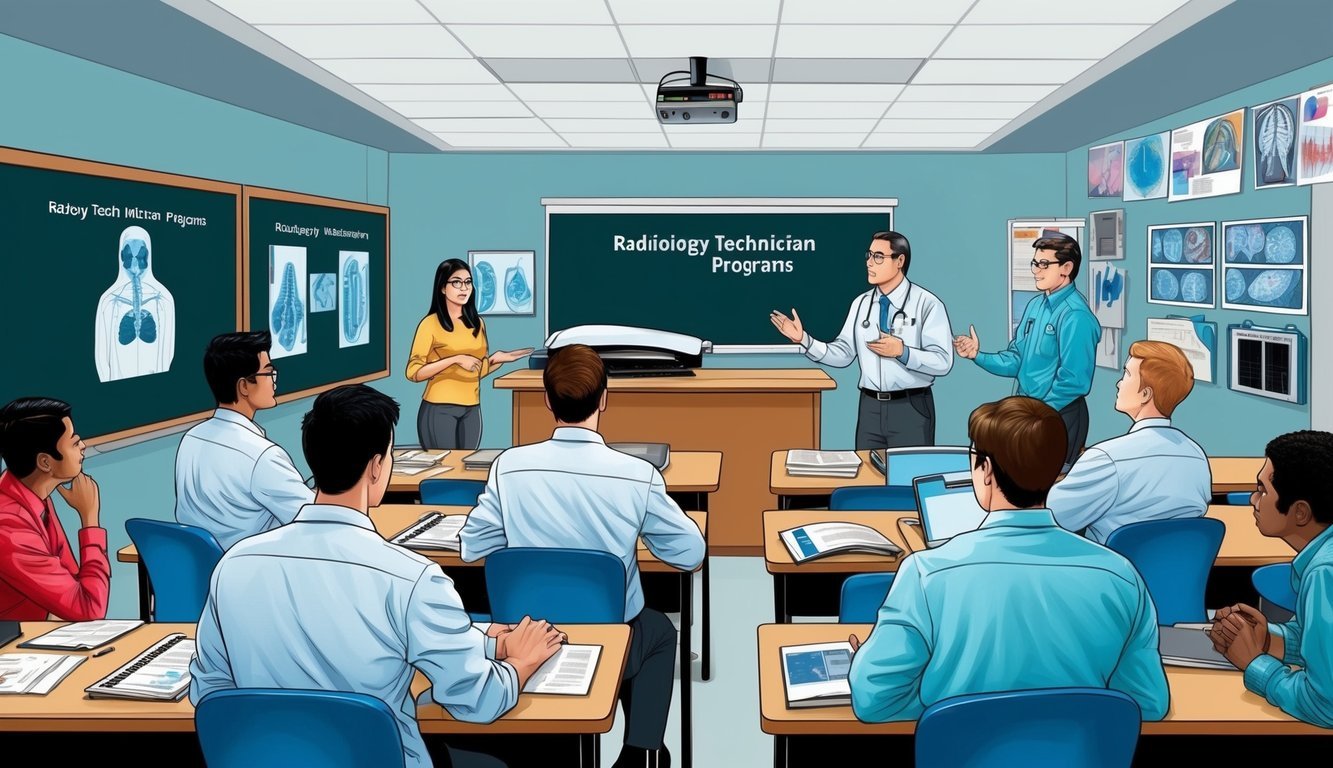
Got questions about radiology tech programs? You’re not alone! Here are some common queries about top schools, program lengths, and career prospects.
What are some top radiology tech programs available online?
Online radiology tech programs are on the rise.
The University of Wisconsin-La Crosse has a solid online offering.
You might also want to check out Weber State University’s online degree in radiologic sciences.
Where can I find top-tier radiology technician programs in the United States?
The Mayo Clinic School of Health Sciences in Rochester, Minnesota is a fantastic pick.
Another great option is the Johns Hopkins Radiography Program in Baltimore.
What colleges offer a four-year degree in radiology technology?
Emory University in Atlanta has a solid four-year program.
You’ll find a strong four-year radiology tech degree at the University of California, San Francisco as well.
How long does it take to complete a radiology tech program?
Most radiology tech programs typically take about two years to complete, although there are some four-year bachelor’s degrees available.
You can find options like that at the Massachusetts General Hospital Institute.
What are the career prospects for graduates of radiology technician programs?
The job outlook for rad techs is promising.
The U.S. Bureau of Labor Statistics expects a 6% growth rate from 2021 to 2031.
Hospitals, clinics, and imaging centers are always on the lookout for skilled rad techs.
Which accredited schools have the best reputation for radiology technology programs?
The Mayo Clinic School of Health Sciences is highly regarded. Johns Hopkins and Emory University are also known for their excellent radiologic tech programs.
“`

